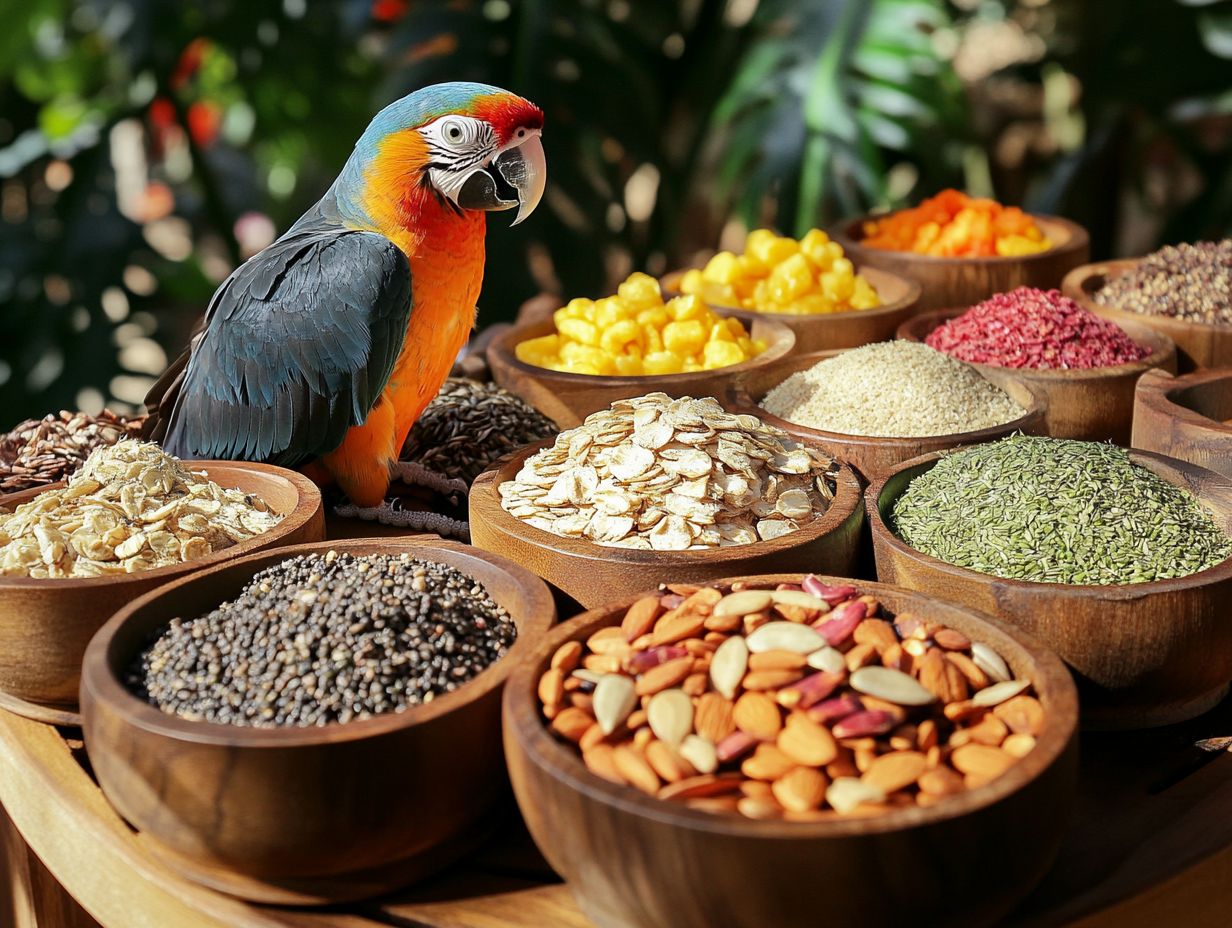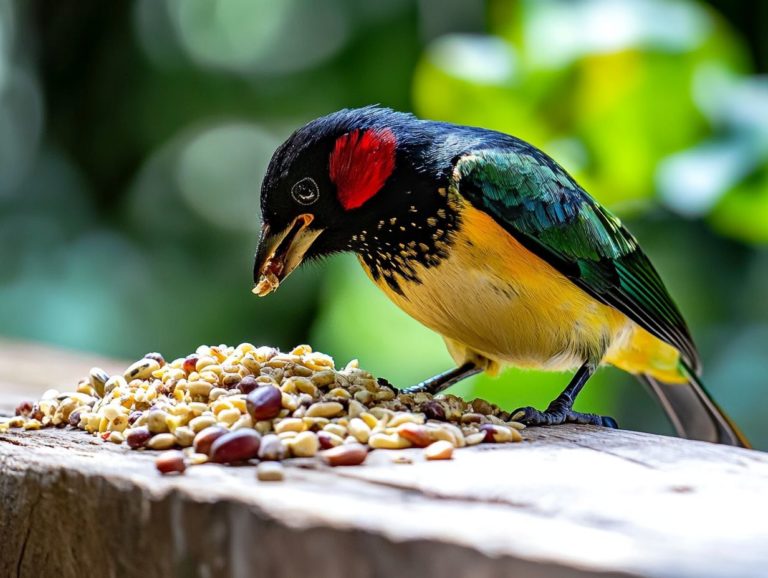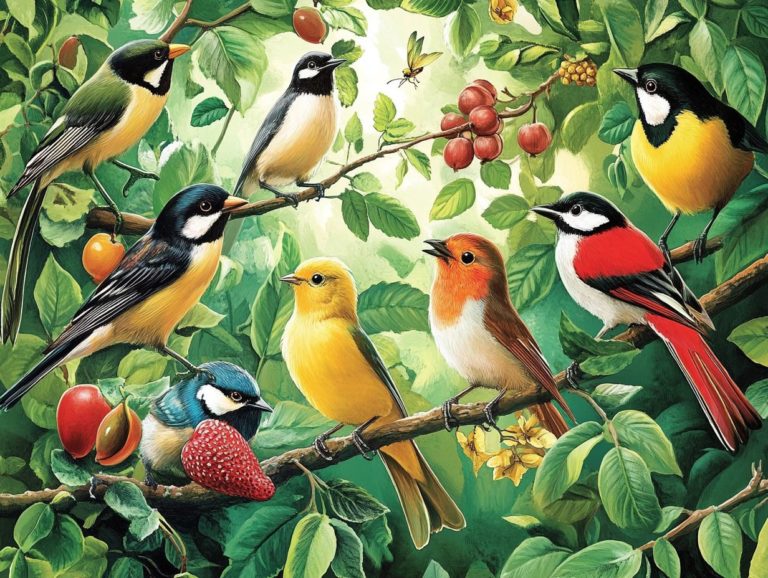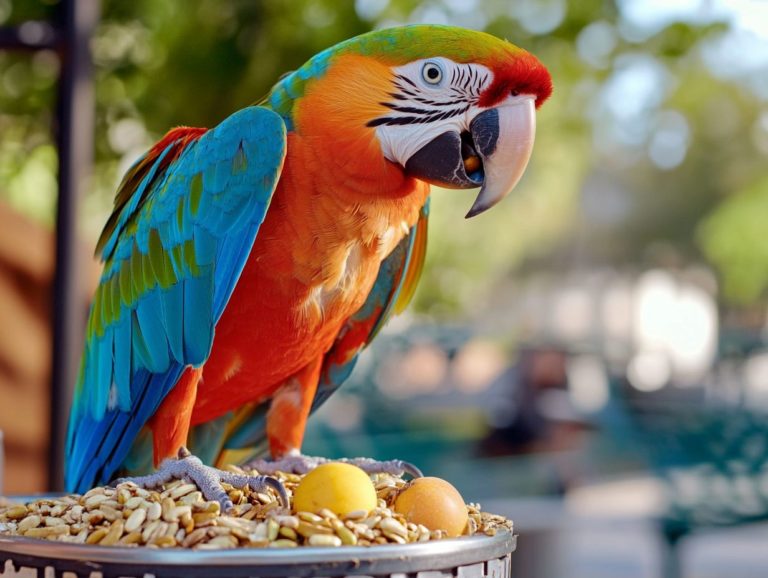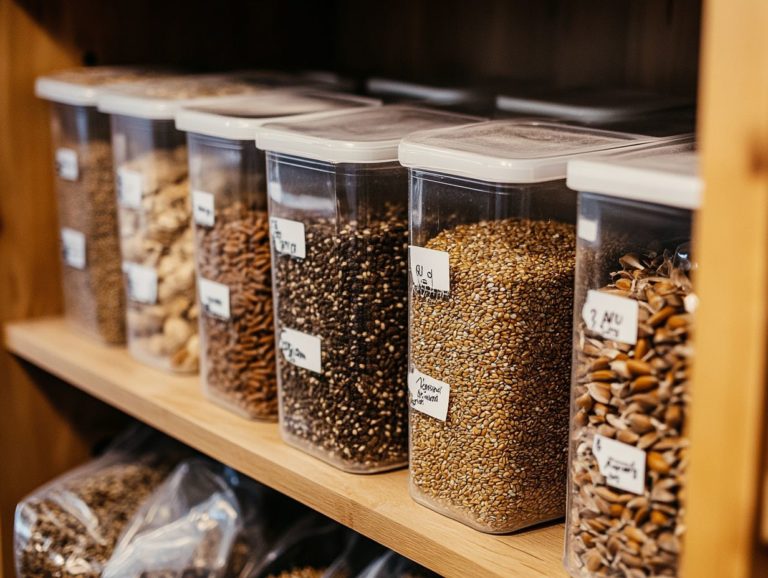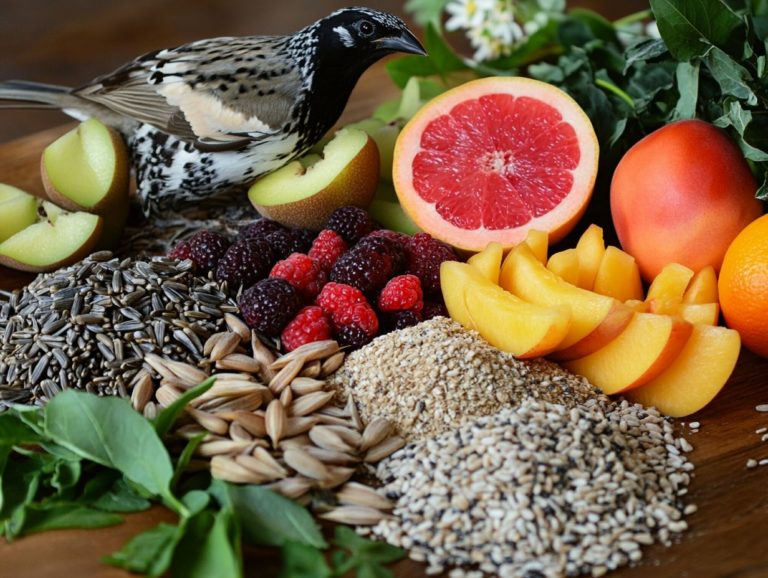How to Make the Switch to Organic Bird Food
Are you eager to elevate your feathered friends’ diets while also making a positive impact on the planet? Organic bird food could be the perfect solution for you.
This article delves into the essence of organic bird food, highlighting its benefits for both your avian companions and the environment. You’ll discover how to transition smoothly to this healthier option.
You ll find guidance on selecting the right products, along with DIY recipes to try. We ll also clear up any misconceptions you might have.
Whether you re a dedicated bird enthusiast or just beginning your journey, you ll gain valuable insights that will enhance the well-being of your birds and help you understand their dietary requirements!
Contents
- Top Benefits of Choosing Organic Bird Food
- What is Organic Bird Food?
- The Benefits of Organic Bird Food
- Transitioning to Organic Bird Food
- How to Choose the Right Organic Bird Food
- Making Your Own Organic Bird Food
- Common Misconceptions About Organic Bird Food
- Frequently Asked Questions
- What is organic bird food and why should I consider switching?
- How do I make the switch to organic bird food?
- What are the health benefits of feeding my bird organic food?
- What types of organic bird food and healthy nutrition should I look for?
- Can I make my own organic bird food and incorporate fresh foods at home?
- Are there any risks associated with switching to organic bird food and implementing dietary changes?
Top Benefits of Choosing Organic Bird Food
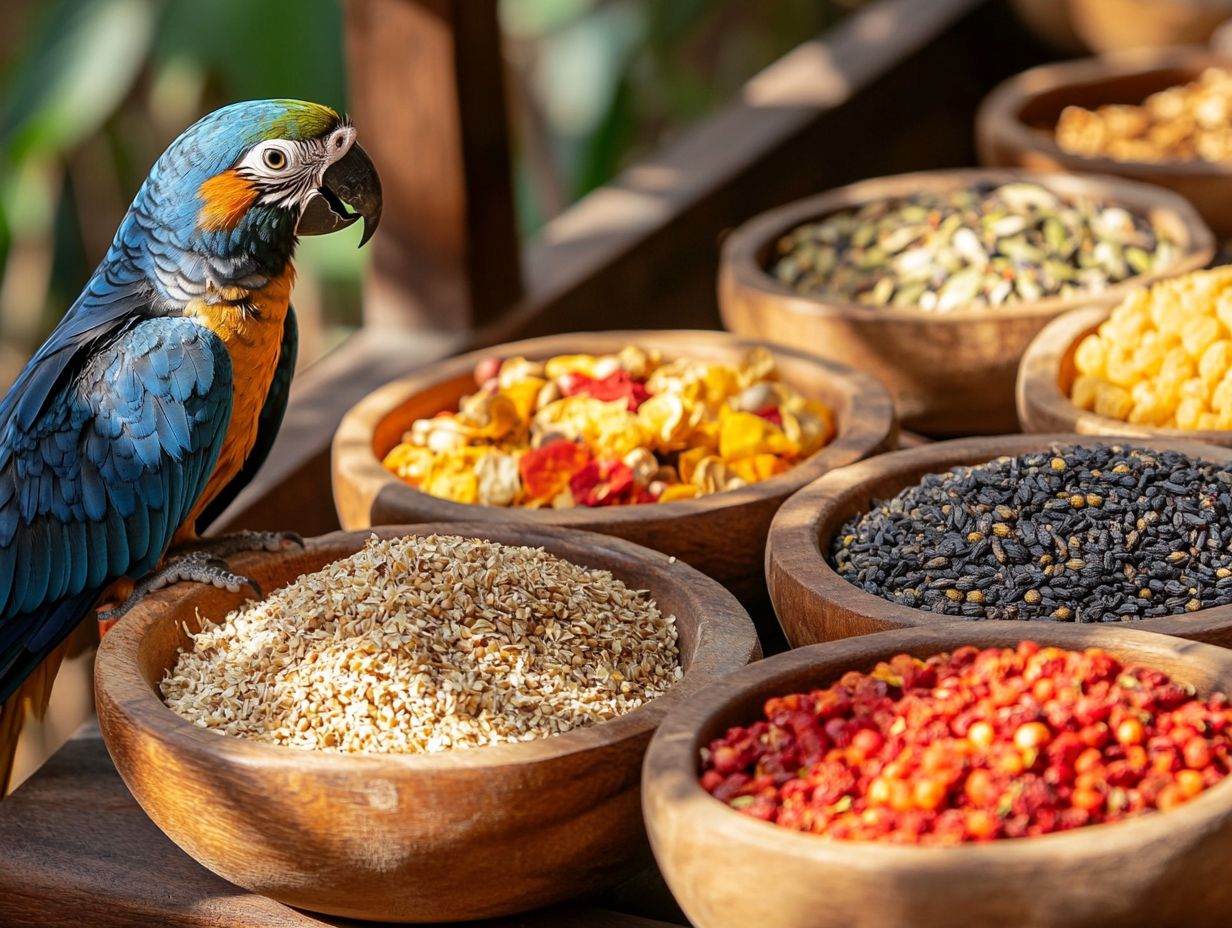
- Organic bird food is a natural and sustainable option for feeding your feathered friends and promoting a healthy environment.
- Switching to organic bird food can improve the health of your birds, such as parrots and canaries.
- When transitioning to organic bird food, take gradual steps and consider factors like ingredients, certifications, and your birds food preferences.
What is Organic Bird Food?
Organic bird food is a carefully crafted diet designed specifically for birds, emphasizing natural ingredients that are free from harmful pesticides and chemicals. This commitment to purity not only supports the health of the birds but also caters to their unique dietary needs.
As urban communities increasingly embrace pet birds such as parrots, parakeets, and canaries, grasping the importance of organic bird food becomes imperative. It plays a crucial role in ensuring their well-being and helps prevent issues like lack of essential vitamins, keeping your feathered companions vibrant and thriving.
Defining Organic Bird Food
Organic bird food stands out for its use of natural flavors and high-quality ingredients, tailored to meet the specific dietary needs of birds, ensuring they receive a well-balanced diet.
This delightful blend typically features a variety of seeds, including sunflower, millet, and safflower, attracting multiple species while providing essential fats and proteins. Pellet diets are crafted to guarantee a balanced ratio of vitamins and minerals, supporting the optimal health of your beloved pet birds.
Both seed and pellet options can be enhanced with fruits, vegetables, and even nuts to meet the unique nutritional requirements of birds, from small finches to larger parrots. By grasping these dietary essentials, you can confidently select the finest organic food to promote vibrant plumage and overall well-being in your feathered companions.
The Benefits of Organic Bird Food
The advantages of organic bird food go far beyond merely catering to the innate preferences of birds; it profoundly improves their overall health and well-being, contributing to the best diet for your feathered friends.
By supplying essential nutrients, organic bird food effectively combats vitamin deficiencies and bolsters a strong immune system, ensuring your feathered friends thrive and maintain proper food habits.
Healthier for Birds and the Environment
One of the key advantages of choosing organic bird food is its dual benefit: it not only supports the health of birds but also significantly reduces the environmental impact associated with conventional farming practices.
By prioritizing sustainable farming methods like crop rotation and natural pest control you contribute to minimizing chemical runoff that can be detrimental to local ecosystems. These practices yield nutritious seeds for the birds while simultaneously creating habitats that nurture a broader range of wildlife.
Urban communities play a vital role in this equation by adopting organic feeding habits. By fostering a culture that encourages biodiversity in city landscapes, you help maintain healthy avian populations and promote sustainable agriculture. This collective effort not only enriches the ecosystem but also makes a meaningful contribution to a cleaner environment for future generations.
Start your journey to healthier bird feeding today by exploring organic options!
Transitioning to Organic Bird Food
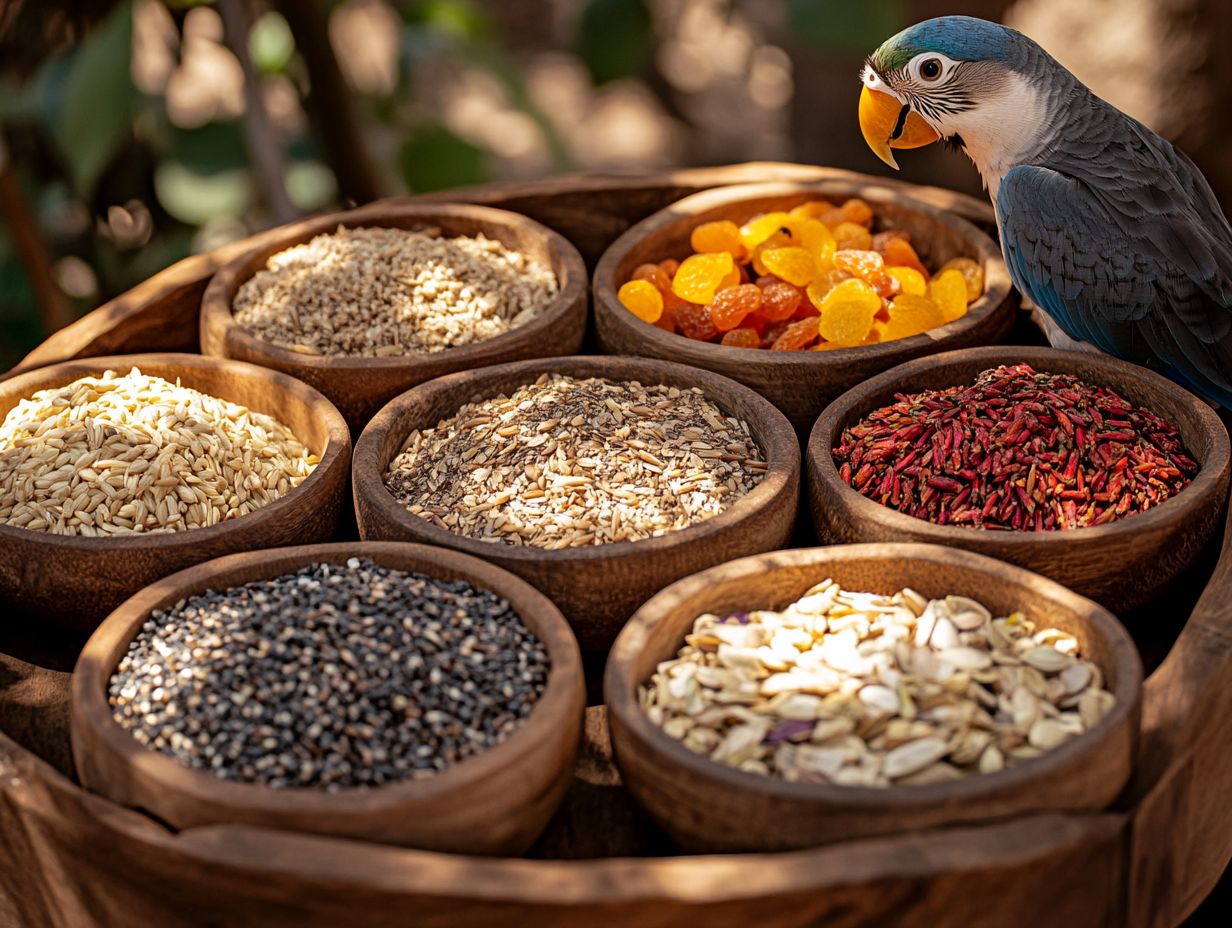
Transitioning your birds to organic bird food requires a thoughtful approach that honors their current eating habits. By gradually introducing new foods, you can refer to how to transition pet birds to new foods to ensure a smooth and healthy adaptation, allowing your feathered companions to thrive on their new diet.
Steps to Take for a Smooth Transition
To ensure a seamless transition to organic bird food, you must follow a structured introduction process that emphasizes careful monitoring and gradual adjustments to the feeding schedule. For detailed guidance, check out how to prepare your bird for a diet change.
This approach helps maintain your birds’ health and allows them to adapt to their new diet with minimal stress. Begin by mixing a small amount of organic food with their regular feed, noting their reactions during the first week. Watch for any changes in behavior, such as a boost in energy levels or shifts in vocalization.
Once they’ve settled in, gradually increase the organic food proportion while fine-tuning portion sizes to prevent overfeeding. By following these steps, you can provide a balanced and nutritious diet that truly supports the well-being of your feathered companions.
How to Choose the Right Organic Bird Food
Selecting the right organic bird food can profoundly influence your pet’s health and happiness. Therefore, you must consider several factors before making a purchase at your local pet store.
Factors to Consider When Shopping
When shopping for organic bird food, consider your birds nutritional needs and the overall quality of the ingredients listed on the label.
It’s vital to ensure the food is free of fillers, which can dilute the nutritional value and leave your feathered friends short on energy. The presence of essential vitamins and minerals is crucial for maintaining their health.
Consulting with bird doctors can provide valuable insights and tailored recommendations for specific bird species, empowering you to make informed choices. Check for certifications and understand the source of the ingredients to enhance quality assurance, ultimately contributing to the well-being of your avian companions.
Making Your Own Organic Bird Food
Making your own organic bird food is an exciting adventure for you and your birds! By using fresh ingredients, you can ensure they receive optimal nutrition tailored to their needs.
DIY Recipes and Tips
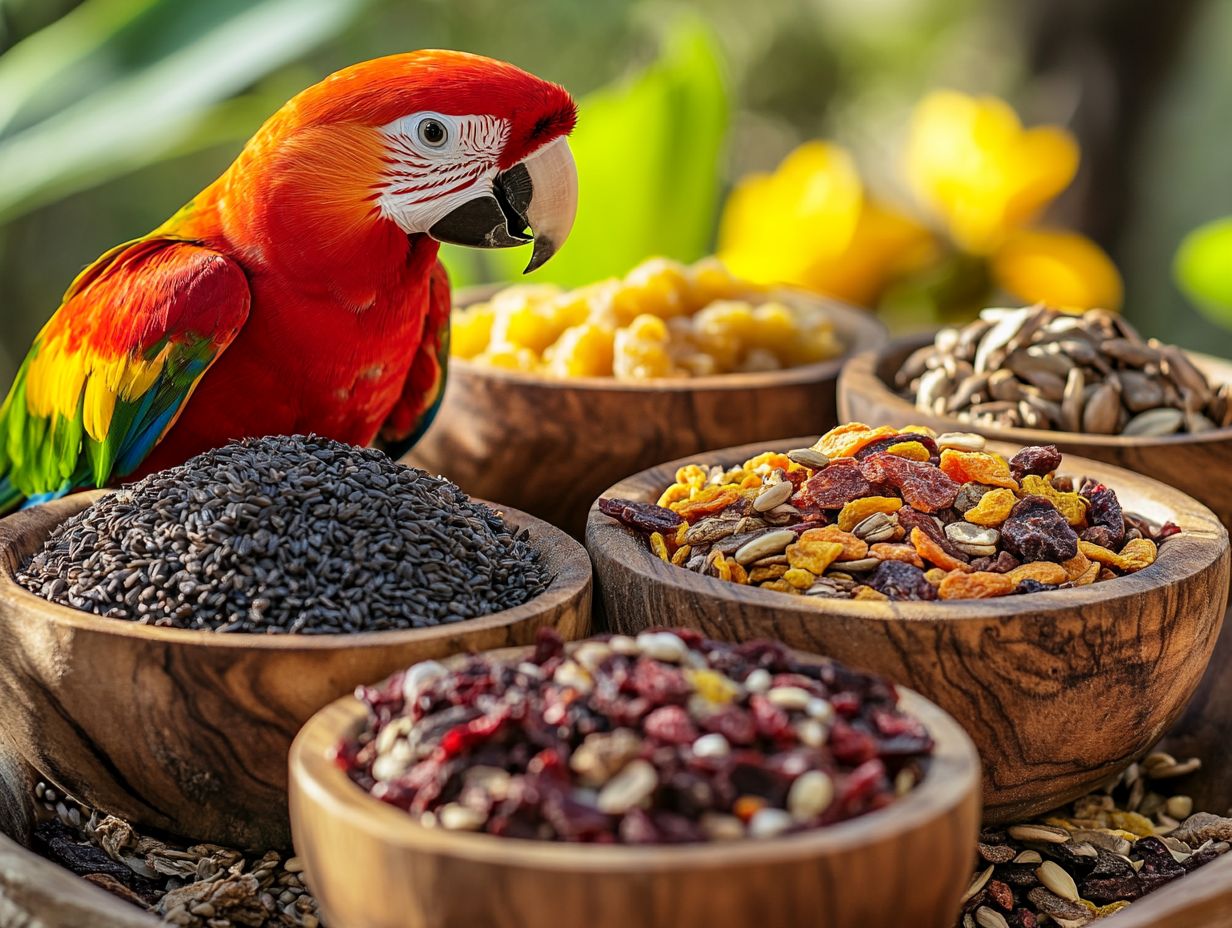
When creating your own organic bird food, you’ll find a wealth of recipes that highlight fresh ingredients and cater to the unique dietary needs of various bird species.
For bird enthusiasts, exploring these recipes not only provides a healthier and more nutritious diet for your feathered companions but also offers a delightful opportunity to connect with nature.
Choosing the right ingredients is essential, as different birds have specific nutritional requirements. By incorporating seeds, nuts, fruits, and vegetables, you can craft a well-rounded diet. Using organic components ensures the food remains free from harmful chemicals and pesticides.
By understanding the dietary preferences of local birds, including their need for a varied food supply, you can create enticing meals that attract a diverse array of species to your backyard.
Common Misconceptions About Organic Bird Food
Despite the increasing awareness surrounding organic bird food, several common misconceptions persist, potentially leading you astray about its benefits, suitability, and the necessity for dietary changes as you consider your pet birds’ dietary goals.
Dispelling Myths and Clarifying Facts
Many misconceptions about organic bird food revolve around its cost and effectiveness in preventing a lack of important vitamins, leading to confusion about the best feeding techniques. You might think organic bird food is too expensive, but this perception can often be misleading. The investment you make now pays off significantly in your bird s health over time.
There’s a common belief that organic options lack adequate nutrients, potentially leading to a lack of important vitamins. Research shows that high-quality organic mixes can be nutritionally complete and specifically designed to meet your birds dietary needs.
It’s important to recognize that the notion of organic food guaranteeing improved health metrics is an oversimplification. While it can be beneficial, other factors such as genetics, environment, and overall care play crucial roles in your birds’ well-being.
Frequently Asked Questions
What is organic bird food and why should I consider switching?
Organic bird food is made from natural, non-genetically modified, and chemical-free ingredients. Switching to organic bird food can significantly improve your bird’s health and overall well-being.
How do I make the switch to organic bird food?
To make the switch, gradually introduce organic bird food into your bird’s diet by mixing it with their current food. Slowly increase the amount of organic food until it becomes their main source of nutrition.
What are the health benefits of feeding my bird organic food?
Feeding your bird organic food can improve their overall health and immune system. It can also increase their energy levels and promote a longer lifespan. Don’t miss out on the chance to boost your bird’s energy and lifespan!
What types of organic bird food and healthy nutrition should I look for?
When looking for organic bird food, read the labels carefully. Look for ingredients such as organic seeds, grains, fruits, and vegetables. Avoid products that contain added sugars, preservatives, or artificial colors.
Can I make my own organic bird food and incorporate fresh foods at home?
Yes, you can make your own organic bird food at home using various organic grains, seeds, and fruits. Just make sure to thoroughly wash and rinse all ingredients before preparing them for your bird.
Are there any risks associated with switching to organic bird food and implementing dietary changes?
The only potential risk is that your bird may not immediately take to the new food. If this happens, try mixing it with their current food or consult with a veterinarian for advice on making the transition smoother for your bird.

